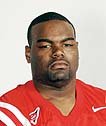"The Blind Side: Evolution of a Game" (W. W. Norton, $24.95) would be dreadful as fiction—a Disneyfied, feel-good failure. A 15-year-old black kid from a big family in the ghetto arrives at the doorstep of an all-white evangelical Christian school. He's adopted by a rich white family; hilarity ensues.
But Michael Lewis writes nonfiction, and hilarity does not ensue. In "The Blind Side," we follow the story of Michael Oher (pronounced "oar") from the time he's taken from the Memphis projects to Briarcrest Christian School on the city's posh east side.
Michael, one of 13 siblings, comes to the school with an 85 IQ—borderline retarded. Neglected by his drug-addicted mother and failed by the foster system, he's on the fast track to a job with the neighborhood drug kingpin. But Michael hasn't developed the me-against-the-world attitude that many such children adopt. Michael—6-foot-5-inches and over 300 pounds—stays mum, a silent giant taking in surroundings that must be completely foreign to him.
What kept Michael sane and gave him hope is Michael Jordan. In his quest to be like Jordan, Michael spent much of his life on the basketball court. To Michael, basketball greatness is made with speed and footwork, two things that don't come naturally to a kid his size.
What he hasn't learned is reading, writing or math, and at Briarcrest, he fails class after class. The tale then takes its Disney turn: Michael is taken in by basketball-star-turned-fast-food-magnate Sean Tuohy and his wife. With their love and tutoring, Michael emerges as a first-rate human being with—to the shock of counselors—an IQ above 100. And that's where the real hurt of this book lies: If this boy, who was thought to be borderline retarded, actually has above-average intelligence, then what about all the rest of the kids stuck in the ghetto? Americans believe that we live in a meritocracy where all things are possible, given the right work ethic. But how does that explain Michael Oher?
Michael is more than a political or moral symbol. Though he barely plays for the Briarcrest football team his junior year, the following summer he gets more than 1,000 letters from college football coaches, most with offers of full scholarships. Briarcrest runs to a state championship behind Michael, and he becomes the most-sought-after player in the nation, eventually enrolling at Sean Tuohy's alma mater, Ole Miss.
Lewis, in "The Blind Side," has written two books: one about Michael, the other about the evolution of professional football. Beginning with the cringe-tastic splintering of Joe Theismann's leg, Lewis traces how NFL executives reacted so that Lawrence Taylor, the New York Giants' ferocious pass rusher—or any Taylor wannabe—couldn't do the same to their own QBs. They found the biggest, most athletic men they could to guard their quarterbacks' blind side, and they paid those men handsomely: Left tackles became among the highest-paid positions on the team.
In his last book, 2003's "Moneyball: The Art of Winning an Unfair Game," Lewis described how one baseball team embarked on a new strategy that gave once overlooked players the chance to outshine the meatheads usually drafted. In "The Blind Side," he tells how shifts in strategy among NFL coaches can percolate all the way down to the Memphis ghetto.
The two narratives of "The Blind Side" merge when it becomes apparent that Michael's size, speed and agility are worth tens of millions to NFL teams, never mind his dreams to play in the NBA. But just as Michael carries his high-school football team, his story carries this book. It's interesting that the NFL's changing needs for player types suddenly made Michael a hot commodity. But even if left tackles had always been highly prized, the story of Michael Oher wouldn't lose any sense of drama. It's not as if the NFL made a worthless kid worth something.
That job falls to the Tuohys. Watching these evangelical Christians guide their new son through upper-class Southern Whitedom, there's plenty to be gleaned about all parties. Leigh Anne Tuohy resolves to teach Michael one new thing about this new world each day: The difference between designer labels; how to eat at an upscale restaurant; how to drive.
Michael's story is largely told by those who surround him. The author does some of his best reporting from Memphis' worst neighborhoods, finding out from what awful circumstances Michael came and to what awful circumstances he would have been headed (satisfying the Tuohys' curiosity as much as his own). In light of those revelations, the pages upon pages spent on the Tuohys' charmed world can be frustrating. But there's no denying their importance to this story: Michael Oher would likely never have made it off the Memphis streets were it not for these rich white people, which is this book's celebration and its tragedy.
This review first appeared in the Washington City Paper.



Comments
Use the comment form below to begin a discussion about this content.